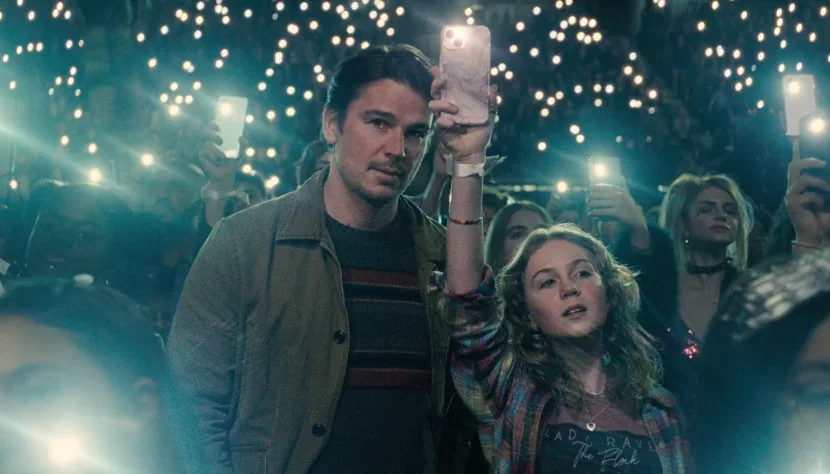TRAP. Don’t Catch Me If You Can’t [REVIEW]

If you want to feel good about M. Night Shyamalan‘s Trap, forget about the meticulously and gradually uncovered mystery of The Sixth Sense or the immersive atmosphere of Unbreakable. M. Night Shyamalan is in a different place in his career and is doing different things. Although the signs of his aesthetic style and his scriptwriting ways of playing with expectations are still recognizable, they are unfortunately just a shadow of his earlier artistic achievements. In Trap, we will find similarities in premises and ideas for cinema, but their execution is much less convincing.
It might definitely be a surprise that this time the creator of Signs lays all his cards on the table right away. In Philadelphia, a serial killer who loves bloody executions, known in the media as “The Butcher,” is on the loose. The Butcher is Cooper (Josh Hartnett), a model husband and loving father of two. He balances his job at the fire department, taking care of his family, and dismembering victims perfectly. Of course, until he doesn’t. Cooper takes Riley (Ariel Donoghue), the older of his two joys, to a concert of her favorite pop mega-star, Lady Raven (Saleka Shyamalan). Very quickly, it turns out that the musical event is an FBI-coordinated trap for the still elusive criminal. The unusual number of police, services, and security immediately worries Cooper. As long as the concert lasts, the man still feels relatively safe. The real challenge and puzzle (for him and the viewers) is finding a way to exit the venue unnoticed.
Everything seems right, but at the same time, so very wrong. The first two acts are a painfully naive game of hide-and-seek. Some might say it’s a deliberate exaggeration and bending of the rules. Others, however, might see it as cartoonish ineptitude and glaring implausibility in a film that doesn’t stray into fantastic realms. Cooper roams freely around the arena. He chats with one employee and steals his ID, at another moment, he walks through a restricted area guarded by FBI agents. It might all add up if it weren’t for the constantly repeated announcement that “we are checking every man! No one is getting through, everyone is a suspect.”

M. Night Shyamalan’s goal was clearly to impress the viewer with how clever and cunning “The Butcher” is, but unfortunately, the first thing that stands out is the bizarre ineptitude and clumsiness of the services. In Trap, things simply have to happen, despite extreme improbability, to push the plot forward. A lot of tolerance (turning a blind eye? patience? inattention?) is required to accept the ease with which Cooper can escape or magically move from one place to another. More than once, you’ll frustratingly ask yourself “How?!”. Don’t expect answers. Shyamalan has stopped adhering to the noble principle that the element of surprise works when it logically fits into the presented world. The Trap does not resemble a precisely planned project but rather a junkyard from which Shyamalan pulled a few plot twists, mixed with his idea of how special services work, and seasoned with a psychological profiling touch. A lot, but not well done.
Trap can provide a lot of fun if we are immune to scriptwriting sloppiness and staging chaos. It can be a movie so bad it’s good or one that tried so hard to be good that it became bad. The last act of Shyamalan’s new film is so liberated, random, and freewheeling that it may only make sense (and be defensible) as a product of Shyamalan’s universe. The fan base and cult of The Sixth Sense’s director seem to have decreased in recent years, but I have no doubt that many viewers will still enjoy getting stuck in this far-from-perfect cinematic puzzle.

